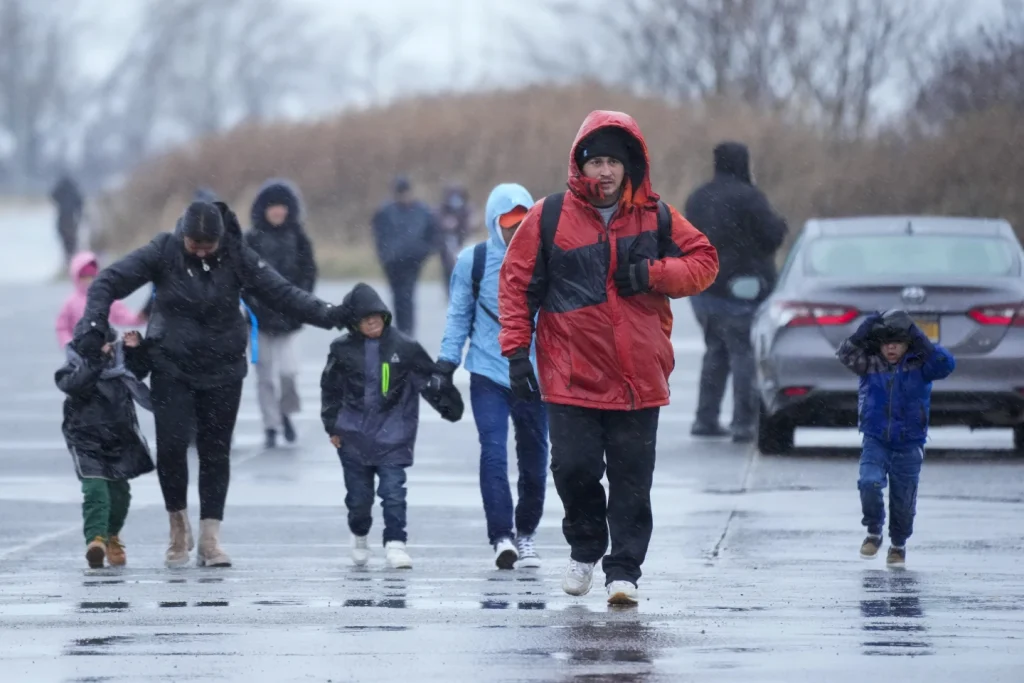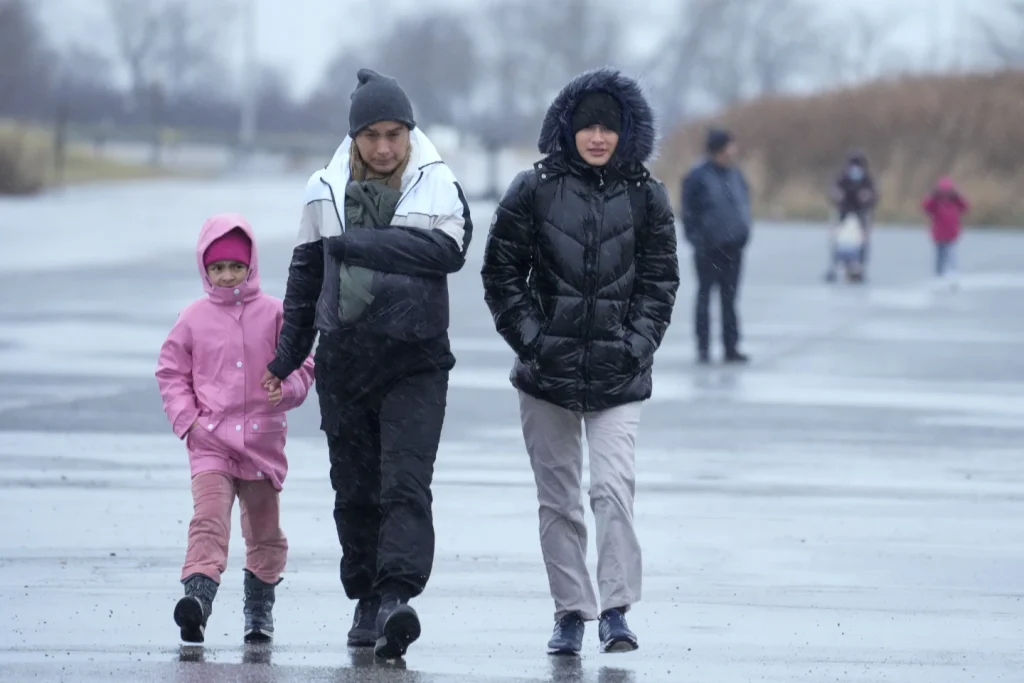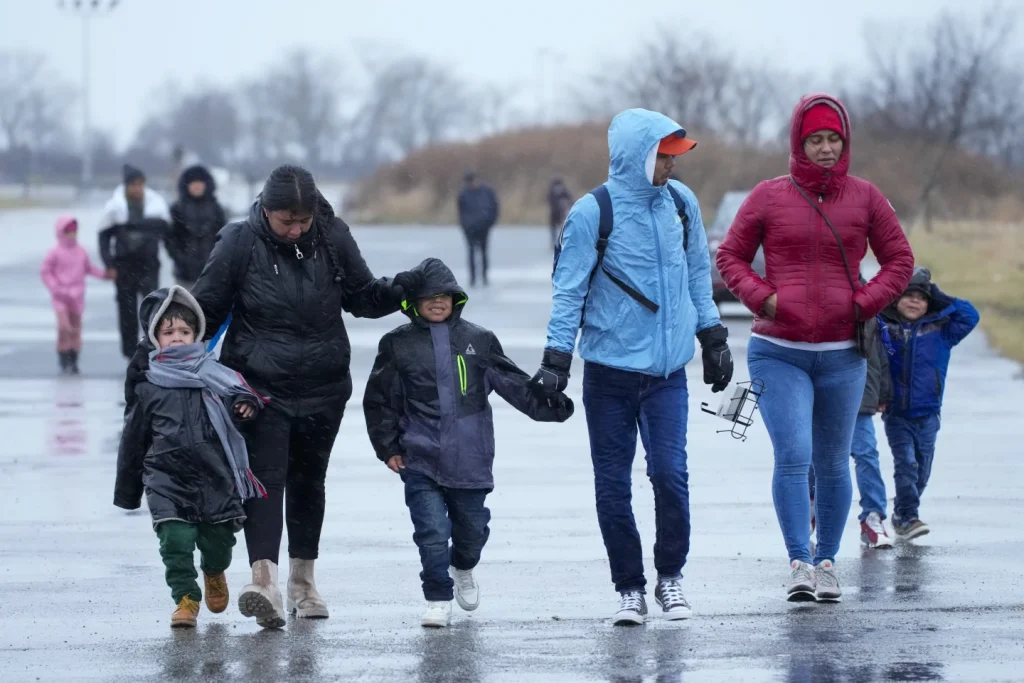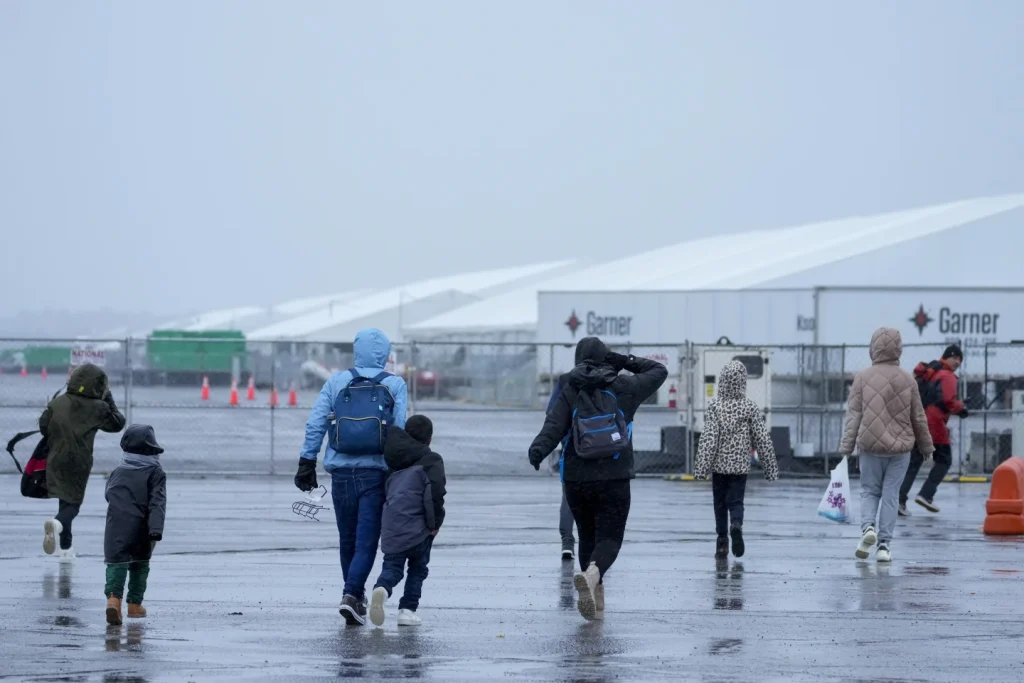The recent events surrounding the erection of a tent complex in a flood zone in Brooklyn, New York to house asylum-seeking migrants have sparked a heated debate and raised concerns about the treatment and accommodation of migrants in the United States.
The decision to place thousands of people in a flood-prone area, far from essential services and schools, has come under scrutiny, particularly in light of the recent storm that necessitated the urgent evacuation of the complex.
The evacuation, which occurred amidst forecasts of a severe storm with heavy rains and strong winds, saw nearly 2,000 individuals, including families with children, being hastily transported to a nearby high school.
This action not only disrupted the normal functioning of the school but also prompted the need for remote classes for the students the following day.
The situation quickly became a focal point in the national discourse on immigration, with conservative politicians and pundits seizing on the issue and the school receiving threatening phone calls.
The incident has reignited criticism of how major cities like New York are handling the influx of migrants, leading to makeshift accommodations being utilized to house the growing numbers.
Other cities, such as Chicago and Massachusetts, have also faced similar challenges, resorting to temporary housing solutions in police stations, airports, city buses, hospital waiting rooms, and churches.
Furthermore, New York City recently implemented a 60-day limit for migrant families staying in city shelters, many of which are repurposed hotels in midtown Manhattan.
The personal experiences of individuals like Luis Lopez, a 40-year-old from Ecuador, shed light on the hardships faced by migrant families, with accounts of sleeping on the floor of a school cafeteria and being abruptly relocated back to the camp in the middle of the night due to the passing storm.
This series of events raises crucial questions about the treatment of asylum-seeking migrants and the adequacy of the resources and infrastructure available to support them.

It underscores the need for a comprehensive and compassionate approach to addressing the challenges posed by the influx of migrants, ensuring their safety, well-being, and access to essential services.
In conclusion, the recent events in New York City have underscored the complexities and challenges associated with accommodating and supporting asylum-seeking migrants.
The need for thoughtful and sustainable solutions, as well as a coordinated and humane response at the local, state, and national levels, is paramount.
It is imperative to prioritize the welfare of migrants and ensure that their basic needs are met with dignity and respect.
This ongoing debate and the experiences of individuals like Luis Lopez serve as a poignant reminder of the human impact of immigration policies and the importance of finding compassionate and effective solutions to address these pressing issues.
The recent events surrounding the encampment at Floyd Bennett Field in Brooklyn, New York, have sparked a heated debate, bringing to light the complex issues surrounding migration, humanitarian aid, and the impact on local communities.
The situation has given rise to a range of perspectives, from concerns about the welfare of migrant families to the disruption of local schooling and the broader implications for the community.
This essay aims to delve into the multifaceted nature of this issue, exploring the perspectives of various stakeholders and the challenges inherent in finding a balanced and sustainable solution.
The experiences of the migrants at Floyd Bennett Field shed light on the hardships and uncertainties faced by those seeking refuge in a new country. Lopez, a father of three, described the ordeal as a “little adventure,” highlighting the resilience and adaptability of migrant families in the face of adversity.
However, it is crucial to recognize the challenges they endure, from the lack of comfortable living conditions to the remote location that complicates access to essential services.
Yeisi Chirinos’ concerns about the safety and comfort of her children underscore the human dimension of the issue, emphasizing the need for dignified living conditions and adequate support for migrant families.
On the other hand, the local community’s response reflects a different set of concerns. The decision to switch to remote learning in order to accommodate the migrants has sparked outrage among parents and politicians, leading to protests and even threats directed at the school.
This reaction underscores the tensions that arise when the needs of different groups come into conflict, raising questions about the allocation of resources and the impact on local infrastructure.
The sentiments expressed by prominent figures such as Elon Musk and local politicians highlight the fear that the needs of migrants are being prioritized over those of the local population, fueling a broader debate about the responsibilities of the government and the potential consequences of accommodating migrant populations.
The situation at Floyd Bennett Field brings to the forefront the complexities of addressing the needs of migrant populations while considering the concerns of local communities.
The site’s vulnerability to environmental risks, as highlighted by Councilor Inna Vernikov, underscores the importance of finding sustainable and safe housing solutions for migrants.
The lack of adequate facilities and the challenges faced by residents in accessing essential services point to the need for a comprehensive approach that addresses both immediate humanitarian needs and long-term integration into the community.
Addressing the challenges posed by the encampment at Floyd Bennett Field requires a nuanced and collaborative approach.
It is essential to prioritize the well-being of migrant families while also acknowledging the legitimate concerns of the local community.
This necessitates a comprehensive assessment of the site’s suitability for housing migrants, as well as a commitment to providing adequate support and resources to both migrant families and the local community.

Furthermore, proactive communication and engagement with all stakeholders are crucial in fostering understanding and collaboration, paving the way for sustainable solutions that benefit everyone involved.
The events at Floyd Bennett Field serve as a microcosm of the broader challenges and complexities inherent in addressing migration and humanitarian needs.
The clash of perspectives and concerns highlights the necessity of finding a balanced and sustainable approach that prioritizes the well-being of migrant families while addressing the legitimate concerns of the local community.
By fostering dialogue, understanding, and collaboration, it is possible to navigate the complexities of migration and work towards solutions that uphold the dignity and rights of all individuals involved.
In a world marked by the movement of people across borders in search of safety and opportunity, the plight of migrant families facing harsh living conditions has become a pressing concern.
The narratives of Chirinos, Sanchez, and Lopez, as described in the provided excerpt, shed light on the challenges faced by families residing in makeshift encampments.
The urgency of their situation demands a thoughtful examination of the circumstances that have led to their current predicament, as well as a call to action for the provision of dignified and sustainable living arrangements.
Chirinos’ lamentation that the current location is not suitable for a family underscores the fundamental need for safe and secure housing.
Her plea resonates with the broader issue of inadequate housing for migrant families, who often find themselves in temporary shelters due to a lack of viable alternatives.
The sentiment expressed by Sanchez, who despite the hardships, maintains a sense of gratitude for having a place to call home, speaks to the resilience and optimism displayed by many individuals facing similar challenges. It is a testament to the human spirit’s capacity to find solace in the midst of adversity.
The concerns raised by city officials regarding the safety and stability of the makeshift encampment at the airfield highlight the precarious nature of the living conditions.
The decision to house families in a location with structural vulnerabilities, compounded by the limitations imposed by federal historic designations, underscores the complexity of the situation.
It is evident that the authorities are confronted with a difficult task of balancing the immediate needs of the displaced families with the constraints imposed by regulatory frameworks.
The words of Lopez, expressing his worries about the ability of the facility to withstand inclement weather, reveal the underlying anxiety and uncertainty experienced by parents striving to ensure the well-being of their children.
The juxtaposition of the children’s resilience with the parental concern paints a poignant picture of the emotional toll exacted by the living conditions.
It underscores the need for urgent intervention to address the physical and psychological well-being of the families residing in the encampment.
The plight of migrant families in temporary housing is a multifaceted issue that demands a comprehensive response.
It is imperative for policymakers, community leaders, and humanitarian organizations to collaborate in developing sustainable solutions that prioritize the safety, dignity, and rights of these vulnerable populations.
The provision of adequate housing, access to essential services, and support for the social and emotional needs of the families should be central to any intervention strategy.
Furthermore, it is crucial to acknowledge the agency and resilience of migrant families, who, despite facing formidable challenges, continue to demonstrate fortitude and hope.
Their narratives compel us to recognize the inherent dignity and worth of every individual, regardless of their immigration status or circumstances.

Compassion, empathy, and solidarity are essential in fostering a more inclusive and equitable society where the rights of migrant families are upheld and respected.
In conclusion, the stories of Chirinos, Sanchez, and Lopez offer a poignant glimpse into the lived experiences of migrant families grappling with the harsh realities of temporary housing.
Their voices beckon us to confront the systemic injustices that perpetuate their plight and to advocate for meaningful change.
By acknowledging their humanity, resilience, and aspirations, we can work towards creating a world where every family, irrespective of their background, can find security, stability, and hope for a better future. The time to act with compassion and urgency is now.
